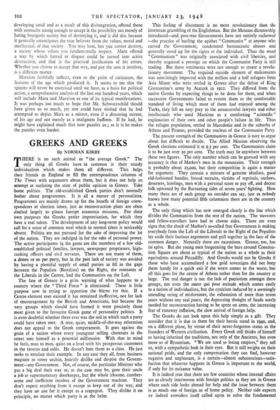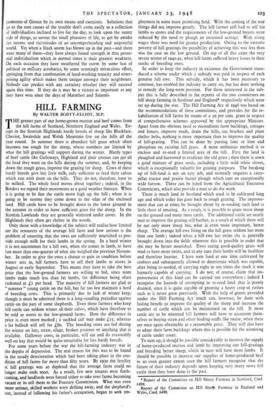GREEKS AND GREEKS
By NORMAN KIRBY THERE is no such animal as "the average Greek." The only thing all Greeks have in common is their sturdy individualism which makes them all different. This helps their friends in England to fill the correspondence columns of The Times with arguments about them, but it does not help an attempt at outlining the state of public opinion in Greece. Take home politics. The old-established Greek parties don't normally bother about programmes. It is all a matter of personalities. Programmes are mainly drawn up for the benefit Of foreign core- spondents at election times, just as reconstruction plans are often drafted largely to please foreign economic missions. For their own purposes the Greeks prefer improvisation, for which they have a real talent. The development of any long-term policy would call for a sense of common weal which in normal times is noticeably absent. Politics are not pursued for the sake of improving the lot of the nation. They are indulged in for the sake of personal power. The active participants in the game are the members of a few old- established political families, lawyers, newspaper proprietors, high- ranking officers and civil servants. There are not many of them, a dozen or so per party, but in the past lack of variety was avoided by having a plentiful supply of small parties to fill in the gaps between the Populists (Royalists) on the Right, the remnants of the Liberals in the Centre, and the Communists on the Left.
The fate of Greece is a grim warning of what happens to a country where the " Third Force " is eliminated. There is little purpose now in trying to apportion the 'blame• for this. If a Centre element ever existed it has remained ineffective, not for lack of encouragement by the British and Americans, but because the very groups which should have formed it were precisely those most given to the favourite Greek game of personality politics. It is even doubtful whether there ever was the soil in which such a party could have taken root. A nice, quiet, middle-of-the-way reformism does not appeal to the Greek temperament. It goes against the grain of a nation where every youngster selling chestnuts in the street sees himself as a potential millionaire. With that in mind he feels, man to man, quite on a level with his prosperous customers in the taverns and cafes. He doesn't hate them as a class. He just seeks to emulate their example. In any case they all, from business magnate to street urchin, heartily dislike and despise the Govern- ment—any Government. Not, of course, the particular Minister who put a big deal their way or, as the case may be, gave their uncle a job as supernumerary doorkeeper, but the whole irksome, cumber- some and inefficient incubus of the (jovernment machine. They don't expect anything from it except to keep out of the way, and they have no use for it except as a scapegoat. They dislike it on principle, no matter which party is at the helm. This feeling of discontent is no more revolutionary than the inveterate grumbling of the Englishman. But the Metaxas dictatorship introduded—and post-war Governments have not entirely eschewed —the practice of hurling the epithet " Communist " at anyone who cursed the Governnient, condemned bureaucratic abuses and generally stood up for the rights of the individual. Thus the word " Communism " was originally associated with civil liberties, and thereby acquired a prestige on which the Communist Party is still trading. But these sentiments were not enough to create a revolu- tionary movement. The required outside element of malcontents was unwittingly imported with the million and a half refugees from Asia Minor who were settled in Greece after the defeat of King Constantine's army by 'Ataturk in 1922. They differed from the native Greeks by expecting things to be done for them, and when successive Governments failed to restore them to the comfortable standard of living which most of them had enjoyed among the Turks, they fell an easy prey to the unsuccessful lawyers and other intellectuals who used Marxism as a comforting " scientific " explanation of their own and other people's failure in life. Thus the refugee population, settled in Macedonia and in the suburbs of Athens and Piraeus, provided the nucleus of the Communist Party.
The present .strength of the Communists in Greece is easy to argue about but difficult to decide. The Allied Mission observing the Greek elections estimated it at 9.3 per cent. The Communists claim it to be just over 5o per cent. The truth may lie anywhere between these two figures. The only number which can be guessed with any accuracy is that of Markos's men in the mountains. Their strength is probably about 25,000, but their compositiOn is again a matter for argument. They contain a mixture of genuine idealists, good old-fashioned bandits, forced recruits, victims of reprisals, outlaws, deserters, hirelings, men with a personal score to pay off, and decent folk uprooted by the fluctuating tides of seven years' fighting. How many there are of each group no outsider can say, just as nobody knows how many potential fifth columnists there are in the country as a whole.
The only thing which has now emerged dearly is the line which divides the Communists from the rest of the nation. The waverers and fellow-travellers have had to choose sides. • There are even signs that the shock of Markos's so-called free Government is making everybody from the Left of the Liberals to the Right of the Populists lay aside their factious arguments and pull together in the face of the common danger. Naturally there are exceptions. Greece, too, has its spivs. But the young men frequenting the bars around Constitu- tion Square are about as typical of the nation as a whole as their equivalents around Piccadilly. And Greeks would not be Greeks if those who have accumulated a few gold sovereigns did not keep them handy for a quick exit if the worst comes to the worst, but all this goes for the centre of Athens rather than for the country at large. The real danger is not the lack of patriotism amongst these groups, not even the sauve qui peat attitude which comes easily to a nation of individualists, but the cynicism induced by a seemingly unending string of misfortunes, the exhaustion of more than seven years without any real peace, the depressing thought of funds sorely needed for reconstruction having to be spent on arms, the increasing fear of runaway inflation, the slow arrival of foreign help.
The Greeks do_not look upon this help simply as a gift. They consider that it is due to them for their heroic stand in 1940, and, on a different plane, by virtue of their never-forgotten status as the founders of Western civilisation. Every Greek still thinks of himself as having inherited the traditions, not only of the Ancients, but even more so of Byzantium. " We are used to losing empires," they tell us, with a sympathetic look in their eyes. But it still weighs on their national pride, and the only compensation they can find, however negative and unpleasant, is a certain—almost subconscious—satis- faction that whatever happens in Greece is important to the world, if only for its nuisance value.
It is indeed true that there are few countries whose internal affairs are as closely interwoven with foreign politics as they are in Greece where each side looks abroad for help and the issue between them is as much one of foreign as of home policy. Neither side expects or indeed considers itself called, upon to solve the fundamental problems of Greece by its own means and exertions. Solutions that go to the root causes of the trouble don't come easily to a collection of individualists inclined to live for the day, to look upon the sunny side of things, to savour the small pleasures of life, to get by amidst the storms and vicissitudes of an -uncomprehending and ungrateful world. Yet when a black storm has blown up in the past—and there were many of them--they have always found strength in that peren- nial individualism which in normal times is their greatest weakness. On each occasion they have weathered the storm by some feat of political or military acrobatics, by some seemingly miraculous effort, springing from that combination of hard-working tenacity and enter- prising agility which makes them unique amongst their neighbours. Nobody can predict with any certainty whether they will succeed again this time. If they do it may be a victory as important as any they have won since the days of Marathon and Salamis.































 Previous page
Previous page